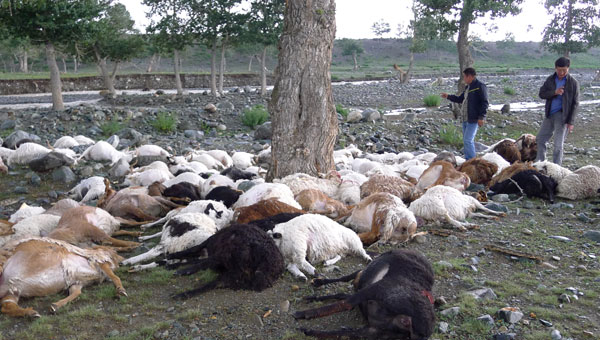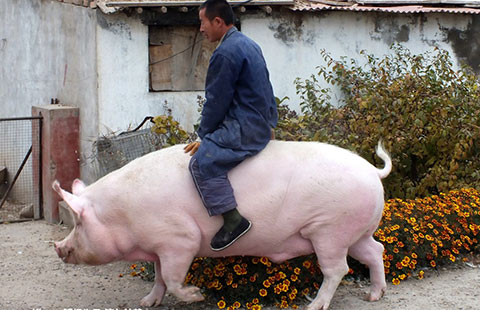173 sheep killed by lightning
By Shao Wei in Urumqi (China Daily) Updated: 2012-07-13 07:51A total of 173 sheep were killed almost instantaneously on Tuesday when lightning struck a mountainous area in the Hoboksar Mongolian autonomous county in the Xinjiang Uygur autonomous region.
 |
|
Herders count the bodies of sheep in Hoboksar in the Xinjiang Uygur autonomous region on Tuesday. A lightning strike killed 173 sheep, a heavy loss for the herders. Qu Jing / for China Daily |
An 18-year-old Mongolian herder recalled the incident as "a nightmare".
"It started raining heavily at midnight and it hailed at around 1 pm. I was very scared and had to hide in the yurt nearby. After the lightning split the sky, the sheep outside bleated and they all died," Alten Bagen said on Thursday.
The tightly packed sheep were sheltering from the rain under a pine tree, which acted as a conductor for the electricity.
In addition, 30 sheep were carried away by floods, Bagen said.
Bagen's father, an experienced herder, was away in the mountains looking after their horses when the accident happened.
"A smell of burned meat filled the air. If I had been here, it wouldn't have happened," the 42-year-old herder said. "The animals were the only source of income for our family of four."
Father and son collected the skins of the sheep, and buried the bodies.
"I'll sell the skins and will make some money. But we can't eat the meat because of our religious beliefs," the father said.
Jangeq Chafu, a local herding technician, said it's common for livestock to get killed by lightning in the summertime, but this was the first time that so many sheep were killed at once.
"The young man doesn't have enough experience. He doesn't know how to cope with thunderstorms in mountainous areas," said Chafu. "It's dangerous for sheep to shelter under trees."
However, Chafu also said that it is sometimes difficult to help livestock escape from lightning.
"The pastures here are in a mountainous area. Locals are used to herding sheep on the mountainside in the summer. They take their yurts and live with the herds. When lightning strikes, the herder can hide in his yurt, but the animals have no place to hide," said Chafu.
"The sheep's wool also generates lots of static electricity, which may make them more vulnerable to lightning," he added.
Chafu said that the government should install lightning rods on mountain peaks.
Fifty-three pigs were killed on July 5 when lightning hit the roof of a barn in a suburb of Shenzhen, South China's Guangdong province.
The pig farmer, surnamed Chen, said the pigs were sleeping after their meals when lightning struck.
"After a streak of blue light flashed by, I heard the pigs scream. Then they were silent," she said.
The neighbors said that the ears, nostrils and mouths of most animals were bleeding, and that their bodies had traces of burns and a slight burned smell. The only pig alive had a broken rear leg and struggled to stand up, but couldn't.
"The simplest way to prevent lightning in high places is to install a lightning rod," said weatherman Yao Chuping, who has worked in the field for more than 20 years.
shaowei@chinadaily.com.cn
- China-Vietnam border major channel for drug smugglers
- China to speed up restructuring of zombie SOEs
- Singapore plays positive role in ties between mainland and Taiwan
- Success of Fox Hunt campaign continues
- SOE changes aim to improve efficiency
- Major farm reform on the horizon
- Deadline set for hukou revisions
- Tibetans weave faith into music
- Xi-Ma meet to lead cross-Strait high-level exchanges
- English skills slip in China: survey







